September 29, 2004
Ladder 49 – A Movie Review
The Heat, The Families, and The Pain
By Fred H. Arm
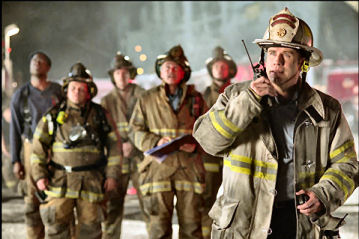
Why do firefighters always run into a burning building when everyone else is running out? It is courage and duty in case you didn’t know. Ladder 49 is about the brave men of Baltimore Firehouse number 49. The film explores their lives, their joys and their grief by way of a compelling glimpse into their families and the individual sacrifices that every firefighter must face when they charge out of the firehouse to save another building or another life at great personal risk and sometimes a great loss.
Rookie Jack Morrison (Joaquin Phoenix) is comically introduced to the family of firefighters at Ladder 49. He is introduced to the chief, Mike Kennedy (John Travolta) who appears at first to be a drunk and he is coaxed into giving his confession to faux priest as his fellow firefighters break into hysteria. He is quickly inaugurated into the “club” and experiences his first baptismal by “fire”.
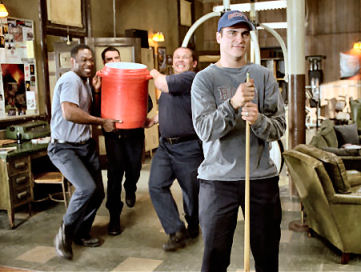
The story is told in a series of flashbacks after the now veteran firefighter Jack is trapped inside a raging inferno. The movie progresses as Jack finds acceptance by his fellow firefighters and enters into love and marriage with Linda (Jacinda Barrett). Thereafter, both Jack and Linda struggle and ultimately accept the negative and dangerous aspects of the job as the deaths and severe injuries take their toll on Jack and his fellow firefighters. The memories of his early life as a firefighter flood Jack's mind while he struggles to break through a wall to make his rescue easier.
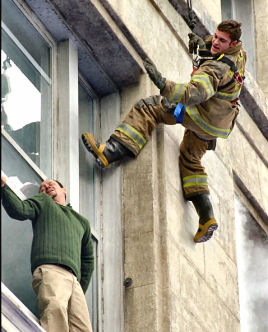
This film seems to be authentically about real people doing real things in the closely-knit community of firefighters. Nothing seems contrived or “Hollywoodized”. In fact, I must admit to being somewhat envious of the intimate community they all seemed to share. It was reminiscent of a lifestyle long passed in America. A community where everyone was connected and concerned about one another, rather than the indifference seen in most of today’s society. A person must have felt that he/she really belonged and mattered to the rest. A collective where you could rely on each other for emotional, financial, and any other assistance you needed.
The characters in this film were all perfectly cast. There were only hints of the usual macho-psychotic behavior exhibited in conventional disaster films. This film felt like it could have happened in any city in America. It was a taste of the factual firefighter’s lives without the fancy dressing and super-hero tactics. The timing, casting, staging, and directing seemed to be just the right blend to evoke the joy, the terror, the spirit, and the flavor of a typical fireman’s struggles and successes. Jay Russell the director puts the audience in the middle of the fire on the screen so well that you cringe when a character is hurt and shed a few tears when one pays the ultimate price.
It is too bad that this movie was not released a month ago just before the anniversary of 9/11. It is a poignant memoriam to all the fallen firefighters that went out on a call that day yet never returned.
"Ladder 49" is more than worth the price of admission. It is a vibrant peek into the world of the fireman and the community of brotherhood they inhabit both on the job and in their homes. This film is a must see for all members of the family.
Opens October 1st.
September 22, 2004
I Heart Huckabees – A Movie Review
Existentialists Meets Psychobabble Going Nowhere
By Fred H. Arm
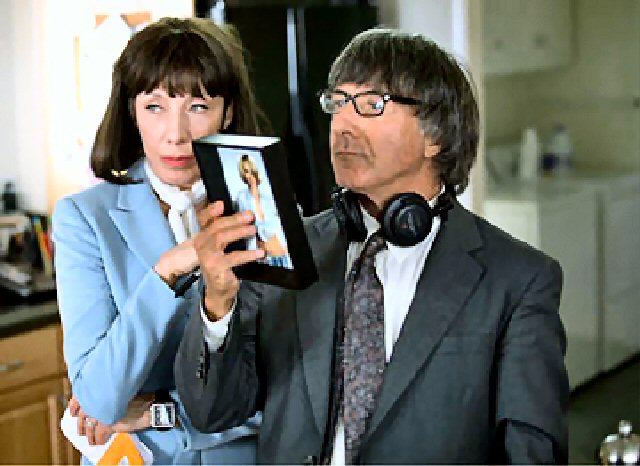
Take a guy named Albert Markovski (Jason Schwartzman) who heads up some sort of Open Space Coalition who seeks the help of existentialist detectives Bernard and Vivian Jaffe (Dustin Hoffman and Lily Tomlin) because he is having some strange coincidences. Mix in difficulties with an executive climbing the corporate ladder at Huckabees superstores named Brad Stand (Jude Law) and his ultimate pairing up with an unlikely friend in the form of firefighter Tommy Corn (Mark Wahlberg) and you should have the ingredients for a good comedic situation. Wrong, wrong and wrong.
This movie is almost too disjointed to bother describing. The film starts out with what would appear to be a clever premise, yet quickly dissolves into a confusing waste of time that may help you catch up on some much needed sleep. Talents like Dustin Hoffman and Lily Tomlin are not only miscast in this supposed “intelligent comedy”, their acting comes across as mixed up and lame as the film itself. What started as a unique exploration into existentialism, rapidly dissolved into a quasi-psychological mish-mash of competing psychosocial disciplines.
The principal character is neither sympathetic, nor hateful, rather he is a nebbish going no place, and neither are any of the other characters. It is a movie we could all do well to pass up and spare ourselves the agony of having to sit through this nonsense. Instead, the bad and unneeded scenes that usually winds up on the cutting room floor, seemed to have been switched with the movie itself and then redigested into an hour and a half of sheer dribble and nonsense. If the shtick they presented had some hilarity to it there might have been some redemptive value; however, only a chuckle or two at most were squeezed out of the bored to tears audience.
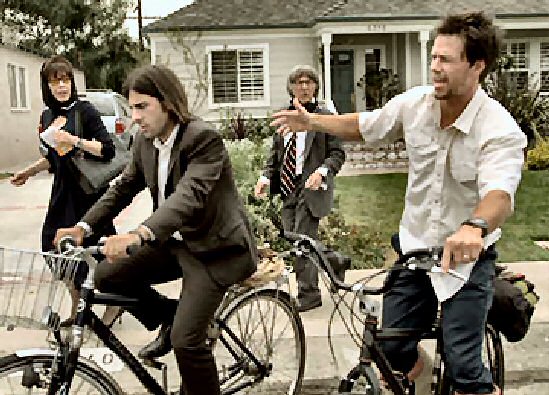
Directer David O. Russell knows how to make a good movie with such hits as “Three Kings”, “Flirting With Disaster”, and “Spanking the Monkey”. So, why subject us to this trash and ruin the reputations of some really good actors and himself as well. If you have to see this film because of your love for the stars playing in it, be prepared for a real disappointment. Go to a ball game.
Opens October 8th in San Francisco.
September 11, 2004
An Open Letter from Sam Hamill
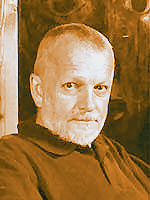 I received this post from Sam Hamill, who created the web site "Poets Against The War". [http://www.poetsagainstthewar.org/default.asp] I think it is worthy of reproduction here.
I received this post from Sam Hamill, who created the web site "Poets Against The War". [http://www.poetsagainstthewar.org/default.asp] I think it is worthy of reproduction here.
September 11, 2004
"Extending the war into Iraq would have incurred incalculable human and political costs. We would have been forced to occupy Baghdad and, in effect, rule Iraq. The coalition would instantly have collapsed, the Arabs deserting in anger and other allies pulling out as well. Exceeding the U.N.'s mandate would have destroyed the precedent of international response to aggression we hoped to establish. Had we gone the invasion route, the U.S. could still be an occupying power in a bitterly hostile land." —George H. W. Bush, 1998
As of today, the casualty count exceeds 1,000 Americans and something in the neighborhood of 30,000 Iraqi civilians killed. The war that George W. Bush said Iraqi oil would pay for has now cost us over $200 billion and that debt grows exponentially every day. The Bushies are still trying to tie Iraq to September 11 and the “war on terrorism” that even Bush admits will never be won. The Republican party has treated the USA to a display of fear- and hate-mongering that hasn’t been seen since the days of Joe McCarthy. Bin Laden is alive and the numbers of his comrades have grown exponentially.
No one, of course, believed for a second that a few thousand American poets could stop this or any other war. But we have entered our sincere pleas at this tribunal of all humanity, and history will ask just how much better off the world would be today had Shelley’s “unacknowledged legislators” been heard by this deaf-eared administration. What can we do but make our gift? And if, as Katha Pollitt truthfully observes in her elegant poem, we often take on a tone of moral superiority, we must admit it, while realizing nevertheless that in matters of nations at war, silence is a crime. We must resist. We must find our lives in words.
No doubt most of the world will pause for a moment this day to remember the horrors and tragedies and eventually heroism of September 11, 2001. And many people all over the world will also reflect on the horrors in Spain and in Russia and in the Sudan and elsewhere; and we will reflect on the inevitable tragedies of empire-building and the long history of bloody crusades undertaken by the government of the U.S.A. We have bombed more than forty countries since the end of World War II. Our history is a long sad litany of almost perpetual warfare, and when we were not ourselves waging war, we were the world’s great supplier of arms. We have repeatedly supported dictators like Manuel Noriega in Panama and Augusto Pinochet in Chile, both put in power by the CIA. How could there not be deep-seated resentment toward such a dictatorial superpower? What message does it send to independent-minded Iraqis when the two most powerful political leaders in their country both have long CIA ties?
Democracy is not a government that can be imposed. We are not a democracy. If we were, Al Gore would be president, and it’s utterly implausible that we would be floundering in the quagmire we presently face at home and abroad. Our air would be cleaner, our water less polluted. And there would have been far fewer children “left behind.” It was the spirit of democracy that inspired the Dr. Kings, the Gandhis, and yes, poets like Whitman, Dickinson, and Hughes (and the generations who follow in the footsteps), to make their commitments to ideals. It is a poet’s business to dream as much as it is a politician’s to glad-hand and grin. But a poet’s dreams are not just fleeting, superficial things. They are the very stuff of what arises from within as we attend with great care and consideration that which informs us from without. The conscious needs the subconscious just as the rational depends on the irrational: each to define itself. Chuang Tzu dreamed he was a butterfly dreaming he was Chuang Tzu and a great philosophy was born.
As we dream of a safer, saner world, we must dare to stand beside our few well-chosen words. We must never fail to correct those who insist that poets are merely dreamers: while freedom and democracy are abstract ideals, we all inch one step closer one step at a time, and artists are as important in that struggle (and in every other) as anyone else. Poetry has entirely practical uses. Who knows how many tens or hundreds of thousands of poems have been written about September 11? Each was necessary. Each was a vital communication.
In Chile, September 11 is the anniversary of the demise—authored by the CIA— of the democratically elected government of Salvador Allende. When Pinochet’s troops stormed into Pablo Neruda’s house, the poet declared, “The only weapons here are words.”
Those who suffered as a consequence of the Attica prison riots remember September 11, too.
We have been victims and we have been executioners. We can do better.
There are presently over 16,000 poems at poetsagainsthewar.org —the largest single-theme anthology ever compiled. Is this to be our final statement? Or is there a lot more work we all agree needs to be addressed? The war most of us oppose is not merely the war in Iraq, but Bush’s plan to rewrite our Constitution and, ultimately, to dominate the world.
I hope everyone will join us in our efforts to free our nation of this neo-fascist administration. Yes, “neo-fascist” sounds harsh, but it was Mussolini who defined “the perfection of fascism” as “the marriage of the corporation and the state.” Government by Halliburton, for Conoco? Is that not what’s at stake? We have no anti-war candidate. But almost any candidate would be an improvement over the mendacious, swaggering international bully presently occupying public housing at 1600 Pennsylvania Avenue. Do not forget for a second that Iraq had no connection to September 11. And September 11 happened on George Bush’s watch despite an August memorandum and many other warning signs.
September 11 is a day that lives in infamy in many ways. When I remember the horrors visited upon the people of New York City, I think of the dreams that perished, foremost among them the shared dream of a peaceful world. Peace can be made only by a commitment to an ideal presented and clarified in a few well-chosen words. Our poetry will remember the shock, the suffering, and the heroism of those days, and also the candles, the flowers, and the continued pleas to Bush from the people of New York City: “Please don’t wage war!” I think of all those connected with the devastation at the Pentagon, the children, grandchildren, friends, who are often left out of the equation because the image of the crumbling towers in a majestic city is so indelibly incomprehensible.
This is not merely a referendum on Iraq. Iraq is only the symptom. The disease is the administration of George W. Bush and Dick Cheney and their Project for a New American Century. It is positively Orwellian. And indeed, what’s at stake is likely to be the future of the world: from endless war to environmental disaster, from the destruction of the middle class to the impoverishment of our constitutional rights, this is the most dangerous, threatening administration in American history. One in three citizens has no faith in the election system itself already, in part because of Bush’s successful theft of the 2000 election.
We must all work diligently for a fair and open election, and for the election of John Kerry and John Edwards. The very fundamentals of our democracy are at risk.
We presently connect with like-minded poets’ organizations in dozens of countries. There is important work we can continue to do in conjunction with poets around the world. I believe it is our duty to join with fellow poets, to listen closely, and to join with them in times of need. But to do so, we must address one major issue immediately: If we are to continue past the November election, we must change our name (something like “Poets for Humanity”?) and establish a democratic leadership and enlist new volunteers. We who founded this organization—and the volunteers who have given so very much—are all exhausted. The international networks are mostly already in place, and we have only to make our organization better organized, more democratic, and more efficient.
If we sustain the organization, there will have to be a small annual fee. We still have about $2000 in debt. A small member fee would allow for web site updating and expansion and perhaps allow us to sponsor a few activities. Anyone knowledgeable and interested in working on organizational transition should contact us. Unless this is accomplished, we shall have no choice but to bid sayonara and go in peace.
-- Sam Hamill
Sam Hamill is the author of thirteen volumes of poetry including Dumb Luck (BOA Editions, 2002), Gratitude (1998), and Destination Zero: Poems 1970-1995 (1995), which won a Pushcart Prize; three collections of essays; and two dozen volumes translated from ancient Greek, Latin, Estonian, Japanese, and Chinese, most recently, Crossing the Yellow River: Three Hundred Poems from the Chinese (2000), Narrow Road to the Interior & Other Writings of Basho (1999), and The Essential Chuang Tzu (1998). He is editor of The Complete Poems of Kenneth Rexroth (2002, with Bradford Morrow), The Gift of Tongues: Twenty-five Years of Poetry from Copper Canyon Press (1996), The Erotic Spirit (1995), and Selected Poems of Thomas McGrath (1988). Hamill taught in prisons for fourteen years, in artist-in-residency programs for twenty years, and has worked extensively with battered woman and children. He has been the recipient of fellowships from the National Endowment for the Arts, the Guggenheim Foundation, the Lila Wallace-Readers Digest Fund, the U.S.-Japan Friendship Commission, and two Washington Governor's Arts Awards. He is Founding Editor of Copper Canyon Press and director of the Port Townsend Writers' Conference. Hamill currently lives in Port Townsend, Washington.
September 02, 2004
Guest Editorial: Won't You Be My Neighbor?
Hi, this is Karen on Water Street. I host Fred's blog (because the idea of a retired trial lawyer with unlimited access to a free press really delights me). I'm stepping in to share a little bit of a downer that happened to me this past weekend. Unsupervised contractor work on Water Street caused this damage to my beloved car--big gobs of industrial-strength glue, baked on the car over the weekend while we were gone.
We're pretty sure how this happened--I distributed flyers and conducted interviews--but the neighbor in question refused to even consider the possibility that she was responsible. At first she said, "I have WITNESSES that the damage was done Friday!" But we were out of town IN THAT CAR until Friday evening, long after the usual hammering and grinding from other contractors had stopped. Then she tried to tell me other neighbors had work done Saturday. But I've already interviewed enough people to know who was doing work (and the workers in question were using a strong glue). Then she tried to tell me she wasn't having any work done Saturday, but we talked to her contractors before we left Saturday morning in our other car. (They were carrying materials from their vehicle to the back of her condo, walking within feet of my car.)
I'm also unhappy that the exchange didn't start with honest discussion: yes, contractor work was done, let's see what really happened. In fact, the neighbor in question slammed down the phone with, "well, what a fine welcome to the neighborhood!" Oddly, I was thinking the same thing.
I'm filing police and insurance reports, but I know I'll end up paying for this one way or the other. I don't blame the contractors in question. They were operating unsupervised, and let's just say English is a long way from being their first language, so I would be willing to bet their guidance was fairly minimal. But I'm getting pretty tired of all the unsupervised work being done in this area, with little or no direction, and I'm even more tired of the lack of accountability or sense of community. On our street, some days there are so many SUVs and trucks that an emergency vehicle couldn't make it past our place (never mind residents backing out of their own driveways, which has become almost impossible). That's not the contractors' fault: the direction needs to come from the owners.
This is what Point Richmond is becoming--less friendly, more dangerous. Watch your cars... watch your backs. Oh yeah, and then there's the mess of lumber she left behind her neighbor's condo. Hello, Merry Maids?
We resume regular programming... carry on, Fred!
